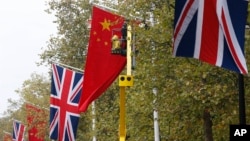As China's President Xi Jinping prepares to travel to Britain next week, officials in both Beijing and London are painting a rosy picture of relations and making grand projections about the impact of the visit going beyond bilateral relations.
But just how far the trip will go toward furthering ties is far from certain, diplomatic analysts say, and not everyone is excited about the visit.
Ties between the two countries are complicated by Britain's colonial history. Still, in preparation for the visit Chinese experts have said the trip will mark the emergence of a "golden era" where the United Kingdom will serve as a gateway for expanding Chinese investments and influence in the West.
Even British ministers have suggested the coming visit could be a game changer, with Chancellor of the Exchequer George Osborne saying the U.K. could become China's "best partner in the West."
London demonstrated its eagerness to be China's preferred partner in Europe in recent months as it became the first Western nation to establish a yuan clearance center and later joined the Beijing-led Asian Infrastructure Investment Bank despite the reservations of officials in Washington.
Former British Prime Minister Tony Blair anticipated "a golden decade" in the U.K.-China relationship. China and France could be important partners for Britain in nuclear energy, and Beijing could help develop its railway infrastructure, he said.
But some analysts see the situation differently, and point to the extremely low level of financial interactions between the two countries. China accounts for a mere 0.1 percent of investment into the U.K. in 2014, suggesting that London will continue to depend heavily on Western markets even after promised Chinese money arrives.
"When such apparent 'pro-China' positions are advanced in public, the result is, paradoxically, to polarize public opinion," David Kelly, an expert with research firm China Policy said. "An incumbent political party advancing a pro-China policy will eventually be challenged by an opposition party that may in various ways 'dog-whistle' an anti-China policy to the electorate."
Human Rights Criticism
A section of the London media has been critical of British ministers seen as pandering to Chinese sentiment and even putting concerns about trade development ahead of human rights in dealing with China.
The British government noted that this week it was currently displaying the cornerstone of the British constitution, the Magna Carta, in Beijing — in the ambassador's residence and later in Renmin University.
This was seen as a move to show that there is no deviation in Britain's faith in the rule of law, even when it is dealing with China.
But the charter was suddenly taken off display at Renmin University, raising questions about whether the Communist Party's Politburo was upset by the move to tutor Chinese students about the British idea of democracy.
"We have yet to see public discussion of the removal from Renmin University," Kelly said. "We may eventually learn, for instance, that they decided to avoid risking misunderstandings, and that no Politburo, National Security Commission or propaganda department level decision was involved. But also possibly the inverse of this."
Some observers fear British ministers would stay silent on issues concerning human rights and Tibet during the Xi visit in order not to upset the investment plans being discussed.
"In terms of human rights and rule of law, the U.K. does need to stand alongside other European partners, the U.S., Australia and other partners in maintaining a consistent line about, for instance, treatment of rights lawyers and journalists in China which run against the regulations and rule of law that the Chinese government itself says it observes," Kerry Brown, director of China Studies Center at the University of Sydney, said.
British Gateway
China is being very blunt about its desire to use Britain as an important gateway that will help extend Chinese investments and influence in Europe.
"If we can take part in nuclear power construction project in the U.K., I think there will be no limit for China to construct nuclear power plants in the Western world," said Feng Zhongping, vice president of the China Institute of Contemporary International Relations.
Feng said Chinese investments in infrastructure will serve an important political need of the British government. Infrastructure development would help the government deal with a section of politicians demanding that the country exit from the European Union.
China, which is struggling to meet its economic growth target of seven percent and counter a slew of bad news on the economic front, also needs some major business contracts in foreign countries to boost its image, David Kelly at China Policy said.
"The visit will add to his foreign policy reputation, and also shore up confidence in the prospects for economic stability, which were placed in question by the stock market and exchange rate shocks over the summer," he said.




